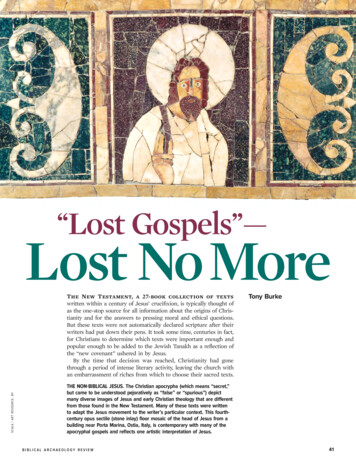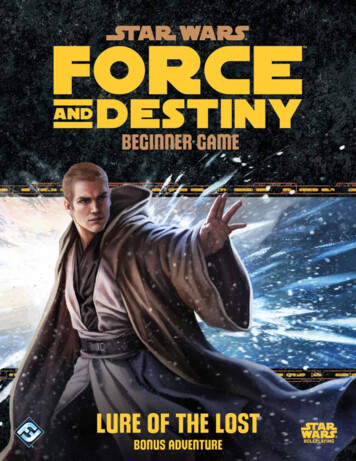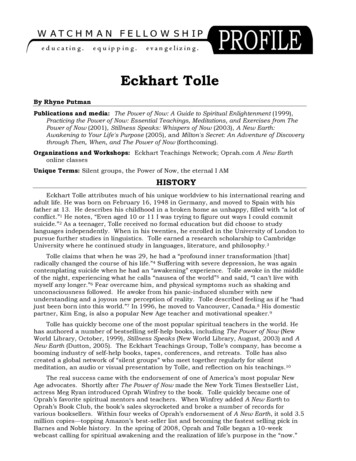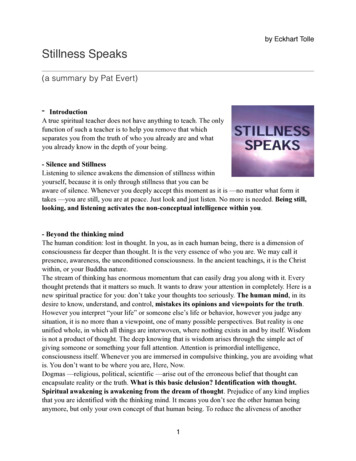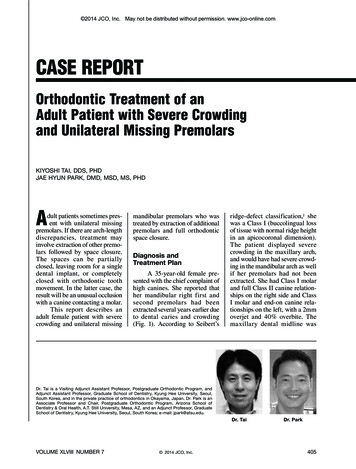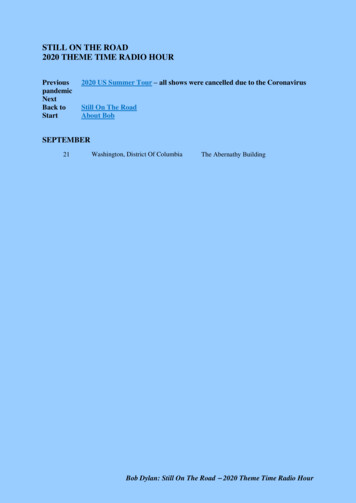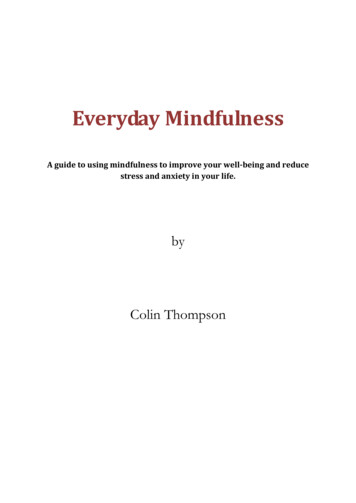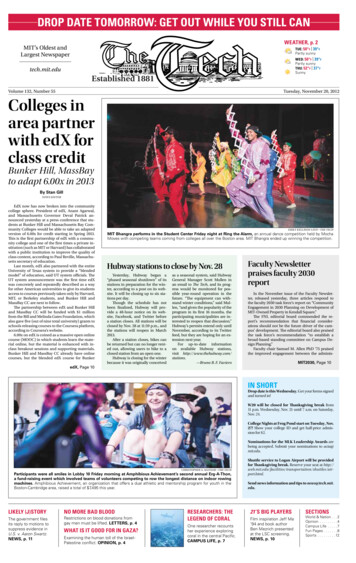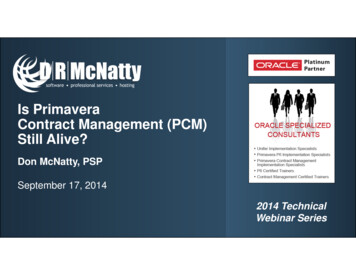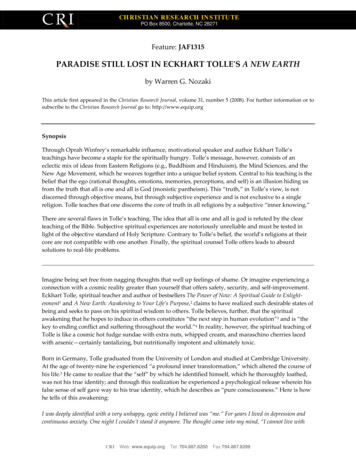
Transcription
CHRISTIAN RESEARCH INSTITUTEPO Box 8500, Charlotte, NC 28271Feature: JAF1315PARADISE STILL LOST IN ECKHART TOLLE'S A NEW EARTHby Warren G. NozakiThis article first appeared in the Christian Research Journal, volume 31, number 5 (2008). For further information or tosubscribe to the Christian Research Journal go to: http://www.equip.orgSynopsisThrough Oprah Winfrey’s remarkable influence, motivational speaker and author Eckhart Tolle’steachings have become a staple for the spiritually hungry. Tolle’s message, however, consists of aneclectic mix of ideas from Eastern Religions (e.g., Buddhism and Hinduism), the Mind Sciences, and theNew Age Movement, which he weaves together into a unique belief system. Central to his teaching is thebelief that the ego (rational thoughts, emotions, memories, perceptions, and self) is an illusion hiding usfrom the truth that all is one and all is God (monistic pantheism). This “truth,” in Tolle’s view, is notdiscerned through objective means, but through subjective experience and is not exclusive to a singlereligion. Tolle teaches that one discerns the core of truth in all religions by a subjective “inner knowing.”There are several flaws in Tolle’s teaching. The idea that all is one and all is god is refuted by the clearteaching of the Bible. Subjective spiritual experiences are notoriously unreliable and must be tested inlight of the objective standard of Holy Scripture. Contrary to Tolle’s belief, the world’s religions at theircore are not compatible with one another. Finally, the spiritual counsel Tolle offers leads to absurdsolutions to real-life problems.Imagine being set free from nagging thoughts that well up feelings of shame. Or imagine experiencing aconnection with a cosmic reality greater than yourself that offers safety, security, and self-improvement.Eckhart Tolle, spiritual teacher and author of bestsellers The Power of Now: A Spiritual Guide to Enlightenment1 and A New Earth: Awakening to Your Life’s Purpose,2 claims to have realized such desirable states ofbeing and seeks to pass on his spiritual wisdom to others. Tolle believes, further, that the spiritualawakening that he hopes to induce in others constitutes “the next step in human evolution”3 and is “thekey to ending conflict and suffering throughout the world.”4 In reality, however, the spiritual teaching ofTolle is like a cosmic hot fudge sundae with extra nuts, whipped cream, and maraschino cherries lacedwith arsenic—certainly tantalizing, but nutritionally impotent and ultimately toxic.Born in Germany, Tolle graduated from the University of London and studied at Cambridge University.At the age of twenty-nine he experienced “a profound inner transformation,” which altered the course ofhis life.5 He came to realize that the “self” by which he identified himself, which he thoroughly loathed,was not his true identity; and through this realization he experienced a psychological release wherein hisfalse sense of self gave way to his true identity, which he describes as “pure consciousness.” Here is howhe tells of this awakening:I was deeply identified with a very unhappy, egoic entity I believed was “me.” For years I lived in depression andcontinuous anxiety. One night I couldn’t stand it anymore. The thought came into my mind, “I cannot live withCRIWeb: www.equip.orgTel: 704.887.8200Fax:704.887.8299
myself any longer.” Then I saw that my thought contained a subject and an object: I and myself. I stood back fromthe thought and asked, “Who is the self that I cannot live with? There must be two here. Who am I, and who is theself that is impossible to live with?” In that moment, that mind-based sense of self collapsed. What remained was I—not the form “I,” not the story-based “I,” the mental story of me—but a deeper sense of being, of presence. I died thatnight psychologically. The mind-made entity died. I knew myself as pure consciousness, prior to form before itbecomes something, before it becomes a thought, before it becomes a life-form: the One Life, the One Consciousnessthat is prior to egoic identity. Then came enormous peace.6After his spiritual epiphany, Tolle devoted a few years to “understanding, integrating and deepening thattransformation,” which eventually led him into his career as a spiritual advisor to others.7 Since thepublication of his first book, The Power of Now, he has gained a significant following, with his mostrenowned disciple being Oprah Winfrey. Actress Meg Ryan initially gave the New Age matriarch ThePower of Now, which Oprah found to be “life changing.” In reading A New Earth, Oprah purports to haveexperienced many more spiritual “aha” moments.8 Through Oprah’s unsettling influence, Tolle’steachings have spread like wildfire, as she has promoted A New Earth via her book club and has hosted amassively attended online class with Tolle as the instructor.One cannot deny that something profound happened to Tolle. As tested by the teachings of the Bible,however, what Tolle discovered is not ultimate truth. Despite the prevalence of Christian terms (e.g.,Jesus, sin, and salvation) and biblical passages in his writings, an examination of the core of his messagereveals an eclectic mix of ideas from Eastern Religions (e.g., Buddhism and Hinduism), the MindSciences, and the New Age Movement, which are woven together into a belief system that has noresemblance to true Christianity. Indeed, in reading Tolle, one must learn to scale a language barrier as heredefines Christian terms and concepts in light of esoteric Eastern spirituality. Some of the more troublingaspects of his teachings include monism, pantheism, pluralism, and relativism.MONISMTolle’s belief system begins with the notion that within everyone is the “ego” or the “illusory self.”9 Asmentioned, this ego is not one’s true identity, but a distortion, and the ego forms the basis for allmisinterpretation of reality.10 In order to attain spiritual awakening, then, one must identify the complexway the “ego” functions11 and perceive the false reality generated by it. He writes,When forms that you identified with, that gave you your sense of self, collapse or are taken away, it can lead to acollapse of the ego, since ego is identification with form. When there is nothing to identify with anymore, who areyou? When forms around you die or death approaches, your sense of Beingness, of I Am, is freed from itsentanglement with form: Spirit is released from its imprisonment in matter. You realize your essential identity asformless, as an all-pervasive Presence, of Being prior to all forms, all identifications. You realize your true identityas consciousness itself, rather than what consciousness had identified with. That’s the peace of God. The ultimatetruth of who you are is not I am this or I am that, but I Am.12According to Tolle, the entire universe, despite the appearance of seemingly infinite forms, is essentiallyone thing. This is known philosophically as monism—the view that all is one. Such diverse andwondrous things, then, as “flowers, crystals, precious stones, and birds” are simply “temporarymanifestations of the underlying one Life, one Consciousness.”13 In other words, the myriad perceivedforms are manifestations of the same reality. It is the mind that creates “an opaque screen of concepts,labels, images, words, judgments, and definitions that blocks all true relationship,” which gives theappearance that an individual is distinct from the rest of the universe; but this is ultimately “the illusionof separateness.”14The monism of Tolle, however, is contrary to Scripture. The problem becomes clear when one carefullyconsiders what it means in the orthodox Christian view for God to be both immanent15 andtranscendent.16 God and creation are in intimate relationship with one another but ontologicallyCRIWeb: www.equip.orgTel: 704.887.82002Fax:704.887.8299
(essentially or substantially) separate from each other. God, according to Scripture, sustains and interactspersonally with creation (Gen. 2:7; Exod. 29:45; Matt. 10:29; Acts 17:27; Col. 1:17; Heb. 1:3, 10); He also,however, transcends creation (Deut. 4:39; 10:14; 1 Kings 8:27; Ps. 113:5, 6; Acts 17:24–25; Eph. 4:6). He isnot the creation, nor is the creation a part of His being. Tolle, however, believes intimacy between Godand man exists because there is no ontological difference between the two; they are ultimately the same,and any observed differences are, in his opinion, just an illusion.Tolle’s monism, moreover, renders certain virtues worthless. If the universe is just one thing, then virtuessuch as love and tolerance become meaningless. Since an aspect of love involves one person performingan act of selfless compassion toward another person, and inasmuch as monism denies love’s prerequisiteof the existence of two distinct persons, monism is incompatible with real love. Monism is alsoincompatible with tolerance, since this virtue involves one person putting up with the conflicting beliefsand/or practices of another person. Love and tolerance, then, are virtues that presuppose a universe withmultiple beings and cannot exist in a universe of only one being. Oprah, ironically, would be hardpressed to find in Tolle’s universe any value for her acts of philanthropy, since she would not be showingcompassion to a distinct other person. Her acts of kindness are really a remnant of the Christianworldview in which she was raised.PANTHEISMA corollary to Tolle’s monistic universe is the belief in a pantheistic deity. Pantheism is the idea that all isGod and God is all.17 After quoting from the Upanishads (part of the Hindu scriptures), Tolle declares,“God, the scripture is saying, is formless consciousness and the essence of who you are.”18 He alsoexplains that consciousness “is the unmanifested, the eternal .Consciousness itself is timeless andtherefore does not evolve. It was never born and does not die.”19 Again he writes, “Being is the eternal,ever-present One Life beyond the myriad forms of life that are subject to birth and death. However, Beingis not only beyond but also deep within every form as its innermost invisible and indestructible essence.This means that it is accessible to you now as your own deepest self, your true nature.”20 Tolle, therefore,not only understands the universe to be one thing, but believes that that one thing is conscious Being.Tolle also prefers not to use the word “God,” because he believes it is an inadequate term to use whenreferring to an infinitely transcendent being. He explains that “God has become empty of meaningthrough thousands of years of misuse.” It is also a “closed concept” that leads one to create “a mentalrepresentation of someone or something outside almost inevitably a male someone or something.”Although Tolle thinks “God” and “Being” are both inadequate words, he opts for the latter because it isan “open concept” and “does not reduce the infinite invisible to a finite entity.”21 Whether we use theword “God” or “Being,” however, in Tolle’s view each represents that which is ultimatelyindistinguishable from the universe.Pantheism logically leads to absurdity, particularly given the idea that people can come to the realizationthat they are, in reality, God or Being. As we have seen, Tolle teaches that God or Being is infinite,timeless, and changeless consciousness and also that in our true essence or nature we, too, are infinite,timeless, and changeless consciousness. If we come to realize this truth, however, as Tolle did at twentynine years of age, then we have changed. We, therefore, cannot be actually infinite, timeless, andchangeless consciousness in our essence, and Tolle is mistaken in believing that his spiritual experiencewas a glimpse into his own true identity as Being.22That God is infinite means not only that He is endless in terms of existence, but that He is boundless interms of all of His attributes; He is not constrained by any limitations. He is, therefore, eternal,omnipotent, omniscient, benevolent, and omnipresent.23 God does not change with respect to theseattributes. This is the nature of an infinite God. He cannot age, for He is eternal with no beginning or end.He cannot grow tired or be hindered by an obstacle, because He is all-powerful. He cannot be ignorant ofCRIWeb: www.equip.orgTel: 704.887.82003Fax:704.887.8299
anything or need an education, because He knows all things. His love never fails. He cannot be confinedto a location or move from one place to another, for He is immediately present to all things.Finite creatures such as humans, however, do not possess God’s incommunicable, infinite qualities.Humans are born and experience time. Human existence does extend beyond the grave in everlasting lifeor everlasting condemnation; however, although human existence has no end, it still has a beginning.God’s existence has neither beginning nor end. Humans have varying degrees of strength, knowledge,and love. As they naturally mature from infancy to adulthood, their capacity of strength, knowledge, andlove also matures. Even before the fall, Adam could exercise strength, knowledge, and love only inaccordance with his good but finite nature. Humans can find faster ways to get from one place to another,but they remain limited by time and space. As mentioned, Tolle cannot be God, since he experienceschange and personal growth, which the infinite, eternal, and changeless God does not experience at all.TRUTH, PLURALISM, AND RELATIVISMTolle acknowledges that his oneness view of the universe must account for the diversity of religious ideaswe encounter in the world. He attempts to resolve this tension by positing that substantive truth cannotbe found in any single religion, though partial truth may be present in many religions. He finds certainconcepts taught by other spiritual teachers (Buddha, Jesus, and so forth) to be helpful; however, he statesthat these teachings were only “precursors” to the ultimate truth, and “their message became largelymisunderstood and often greatly distorted. It certainly did not transform human behavior, except in asmall minority of people.”24Tolle declares, moreover, “All religions are equally false and equally true, depending on how you usethem. You can use them in the service of the ego, or you can use them in the service of the Truth.”25 Thishappens, he teaches, because religions may start with truth, but over time they get corrupted.26 In otherwords, the major religions never effectively recovered “the transformative power of the originalteachings.”27 All religions, therefore, Tolle believes, offer only glimpses of truth, and no religion has thetotal truth.When dealing with any clear disparity between his teachings and other religions, Tolle notes, “Man made‘God’ in his own image. The eternal, the infinite, and unnameable was reduced to a mental idol that youhad to believe in and worship as ‘my god’ or ‘our god.’”28 The truth, then, according to Tolle, rests in thecontinuity of ideas that all religions have with one another. Elaborating on the idea of man making Godin his own image, he explains,If you go deep enough in your religion, then you all get to the same place. It’s a question of going deeper, so there’sno conflict here. The important thing is that religion doesn’t become an ideology .the moment you say “only mybelief” or “our belief” is true, and you deny other people’s beliefs, then you’ve adopted an ideology. And thenreligion becomes a closed door. But, potentially, religion can also be an open door.29Any contradiction between religious beliefs thus, Tolle believes, can be attributed to a manmadeconstruct or ideology, and not to the truth; conversely, any agreement between the beliefs amongreligions (which there must be, since they are the same, he believes, at their core) is the truth.In reality, all religions are not the same at their core. Hinduism at its core affirms pantheistic monism, inwhich many gods and human personalities appear to interact with each other, but do no such thing, sincethey are ultimately just extensions of the one absolute reality of the impersonal Brahman. Judaism,Christianity, and Islam, on the other hand, all affirm the existence of a monotheistic God who isontologically separate from His creation.30 Moreover, Christianity at its core affirms that the one true andliving God is triune,31 whereas Judaism and Islam teach a strictly Unitarian deity. The list of incompatiblecore teachings among the world’s religions is extensive.CRIWeb: www.equip.orgTel: 704.887.82004Fax:704.887.8299
Quite disparate religions might have externally common features (e.g., the moral imperative to feed thepoor), but even at this level it becomes clear on analysis that fundamental differences exist (e.g., why weshould feed the poor). The Christian belief in salvation by grace through faith in Jesus Christ and thegood works that follow in response to salvation should not be confused with the Buddhist realization ofsuffering and its Eightfold Path to eliminate suffering.32Pointing out the distinguishing features of religion, moreover, is simply telling the truth, not advocatingan “ideology,” as Tolle would have us believe. If when a student answers on her math test that “1 1 3”and the teacher marks it incorrect, the teacher is not touting an ideology; the teacher is just pointing totruth.Tolle’s final arbiter of truth, however, is subjective experience. He purports that “the New Testamentcontains deep spiritual truth as well as distortions,” with the latter occurring because of “amisunderstanding of Jesus’ teaching” or “because people had an agenda,” but teaches that by accessingone’s “inner knowing,” one can “sense what is true and what was added on or distorted.”33There are good reasons, however, to believe that the New Testament writers did not distort the teachingof Jesus. Since the writings of the New Testament can be dated prior to AD 70,34 it is not likely that thewriters had an opportunity to distort either His teaching, or teachings about Him. Not enough time hadelapsed between the events and the writing for that to occur, and many eyewitnesses to the ministry ofJesus would have been around to correct any distortions or myths.35Tolle is also inconsistent in his own perspective on religion. He argues, on one hand, that those who makeabsolute truth-claims, like “only my belief” is true, are motivated by a deception of ideology. On theother hand, he asserts many absolute truth-claims in his own writings and teachings, including the truthclaim that those who make truth-claims are motivated by a deception of ideology! Tolle pronounces,moreover, that “millions are now ready to awaken because spiritual awakening is not an option anymore,but a necessity if humanity and the planet are to survive.”36Tolle certainly has no way of validating the truth-claim that his teaching is the one truth that can bringmass spiritual enlightenment for all humanity. He may have the testimony of his obscure spiritualepiphany, but he has no objective means of verifying his truth-claim. Christians, however, readily pointto credible historical evidence for the bodily resurrection of Jesus in support of their belief in Him as Godand Messiah. Only Jesus’ resurrection can account for the remarkable New Testament departure of thepeople of God from observance of the Mosaic Law concerning animal sacrifice.37SCRIPTURE TWISTINGThe principal method Tolle uses to harmonize the Bible and Christian theology with other religions is anesoteric redefinition of terms based on his subjective experience. More directly, Tolle attempts to discernwhatever “spiritual truth” is in a biblical passage by relying on an “inner knowing,” and this purelysubjective knowing conforms to an Eastern spirituality—ideas drawn from Hinduism, Buddhism, MindSciences, and the New Age Movement. For example, the “new earth” (Rev. 21:1; cf. Isa. 65:17) is “theouter forms created by awakened doing.”38 The term “sin” is redefined as “to miss the point of humanexistence” (emphasis in original).39 Jesus’ words, “I am the way, the truth, and the life” (John 14:6), are nota declaration of being humanity’s only means of entering into a relationship with the Almighty, but “theinnermost I Am, the essence identity of every man and woman, every life-form, in fact.”40 Elsewhere,Tolle teaches on the “transformation of human consciousness” and makes the following error: “In Hinduteachings (and sometimes in Buddhism also), this transformation is called enlightenment. In the teachingsof Jesus, it is salvation, and in Buddhism, it is the end of suffering. Liberation and awakening are otherterms used to describe this transformation” (emphases in original).41Tolle’s method of biblical interpretation is not new, as many cults follow the same pattern of twistingScripture to accord with their heresies. His method, again, is to interpret whatever biblical text heCRIWeb: www.equip.orgTel: 704.887.82005Fax:704.887.8299
encounters in such a way as to conform with his subjective views of his own experience, which areinfluenced by Eastern spirituality. Insofar as his method of biblical interpretation is driven by untestablesubjectivity, there is no exegetical warrant to adopt his interpretations. In addressing a concerned studenton her observation of discrepancies between his teaching and what she learned being brought up aCatholic, Tolle responds,Well, religion can be an open doorway into spirituality, and religion can be a closed door. It prevents you from goingdeeper. And when I went through this inner transformation, and for the first time accidentally I picked up a copyof the New Testament at my mother’s place.[sic] And I started reading and I immediately recognized the deep truthsthat is there, and I realize the truth that is deeper, that is expressed in what Jesus said, is much deeper than whatyou, how the church interprets it.[sic] There’s a depth to it. And it reflects your own depth when you read it. Sothere’s no conflict between this teaching, which is purely spiritual, and any religion .Because if you go deepenough in your religion, then you all get to the same place. It’s a question of going deeper, so there’s no conflicthere.42Tolle’s method of interpreting the Bible, then, begins with his “inner transformation,” which allows himto discover for the first time deeper truths than what the student or the church has ever understood. Thisspiritualizing of the text, he believes, prevents the Bible from conflicting with the teachings of otherreligions.Sound hermeneutics, by contrast, requires the Bible student to discover the message that the inspiredauthor intended to communicate to his original audience, which involves understanding what eachpassage meant within its original historical and grammatical context. Once the student discovers theobjective interpretation, he or she can draw out a personal application.43 The spiritual message Tolleattempts to read into the biblical text, however, is utterly foreign to the first-century Jewish context ofJesus’ teachings and the inspired writings of the New Testament.44AWAKENING TO MISS LIFE’S PURPOSETolle’s teaching in general focuses on practical ways to identify the complex deceptions that the egoallegedly manufactures, offering spiritual exercises to awaken to a true consciousness. These spiritualexercises are not benign; rather, they reaffirm the practitioner’s belief in the erroneous aspects of hismetaphysical worldview (e.g., monism, pantheism, and so forth), and consequently lead practitionersinto adopting absurd solutions to real-life problems, ultimately missing out on the whole purpose of lifein general.One absurd solution to real-life problems derived from Tolle’s spirituality is the discouragement ofrational thought. The quest to understand “Being,” according to Tolle, is already within one’s deepestself. “But don’t seek to grasp it with your mind,” he advises. “Don’t try to understand it. You can know itonly when the mind is still. When you are present, when your attention is fully and intensely in the Now,Being can be felt, but it can never be understood mentally.”45 Apparently, thinking is “the root of theego.”46Another example of Tolle’s absurd solutions to real-life problems is seen in an aspect of the alleged egocalled the “pain-body,” which dwells within each person. He teaches that this is a “semi-autonomouspsychic entity,” which is formed by “negative emotions that were not faced, accepted, and then let go inthe moment they arose” and are “stored in the cells of the body.”47 Tolle says there is also a “collectivehuman pain-body containing the pain suffered by countless human beings throughout history.”48 Hebelieves the “pain-body” is the source and cause of our negative experiences. For example,When you realize that pain-bodies unconsciously seek more pain, that is to say, that they want something bad tohappen, you will understand that many traffic accidents are caused by drivers whose pain-bodies are active at thetime. When two drivers with active pain-bodies arrive at an intersection at the same time, the likelihood of anCRIWeb: www.equip.orgTel: 704.887.82006Fax:704.887.8299
accident is many times greater than under normal circumstances. Unconsciously they both want the accident tohappen.49Tolle also believes that the active “pain-body” energy of one person can be transferred to another. Herealized this through experiencing a series of events, which began with an intense counseling sessionwith a female client with lots of emotional baggage. A few minutes after the session had ended and thewoman left, a friend came into the room where the counseling took place and blurted, “The energy feelsheavy and murky—it almost makes me feel sick. You need to open the windows, burn some incense.”Tolle later had dinner in a restaurant and witnessed an outburst by another patron. He then concluded, “Isuspected that the universal human pain-body had come back to tell me, ‘You thought you defeated me.Look, I’m still here.’ I also considered the possibility that the released energy field left behind after oursession followed me to the restaurant and attached itself to the one person in whom it found a compatiblevibrational frequency, that is to say, a heavy pain-body.”50If one grants the plausibility of a worldview like Tolle’s in which God is indistinguishable from theuniverse, perhaps something like a pain-body hypothesis has some explanatory power. As we have seen,however, such a worldview is wholly incompatible with a biblical worldview and cannot stand up to theharsh light of reason. Without such a pantheistic monism in which to adhere, Tolle’s pain-bodyhypothesis has no credible rationale to commend it. It seems instead simply fanciful.The way Tolle describes the activity of the “pain-body” also creates a confusing system of ethics,particularly in the way one determines right and wrong, as well as reward and punishment. After posingthe question, “Does this mean that people are not responsible for what they do when possessed by thepain-body?” Tolle answers, “How can they be? How can you be responsible when you are unconscious,when you don’t know what you are doing? However, in the greater scheme of things, human beings aremeant to evolve into conscious beings, and those who don’t will suffer the consequences of theirunconsciousness. They are out of alignment with the evolutionary impulse of the universe.”51 Tolle’sanswer is a paradox: because people who are governed by the “pain-body” are unconscious of reality,they cannot be held responsible for what the “pain-body” makes them do; nonetheless, they will continueto suffer the consequences of their unconscious actions until they learn their lesson and becomeconscious.Tolle therefore sees the “pain-body” playing a role in enlightenment. He reasons, “When you can’t standthe endless cycle of suffering anymore, you begin to awaken. So the pain-body too has its necessary placein the larger picture.”52 The “pain-body,” then, is a source of traumatic experiences, but also part of theprocess of awakening to the truth.Since Tolle’s monistic and pantheistic universe is untenable, no good reason exists for one to think thatlife’s purpose is to employ Tolle’s spiritual techniques to detach oneself from the illusion of the self (i.e.,one’s thoughts, feelings, memories, individuality, relationships, and social status) to awaken to theultimate reality of Being. Commitment to his false spiritual quest is missing life’s purpose. The Christian,however, can look to the certainty of the resurrection of Jesus Christ as evidence of the truthfulness of Hismessage. Christ taught that life’s ultimate purpose is to enter by faith into a relationship with Godthrough the way He forged via His own death and resurrection. Becoming a redeemed creation eternallyworshipping the Creator is what God intended from the beginning.Warren G. Nozaki received his M.Div. from Talbot School of Theology and is a research specialist at theChristian Research Institute (CRI). This article was first published in booklet form for CRI under the titleof Paradise Still Lost in a New Earth: Exposing the Errors of Eckhart Tolle (Charlotte, NC: ChristianResearch Institute, 2008).CRIWeb: www.equip.orgTel: 704.887.82007Fax:704.887.8299
notes1Eckhart Tolle, The Power of Now: A Spiritual Guide to Enlightenment (Novato, CA: New World Library, 2004).2Eckhart Tolle, A New Earth: Awakening to Your Life’s Purpose (New York: Plume, 2005).3“Biography,” Eckhart Teachings, http://eckharttolle.com/eckhart biography, accessed March 28, 2008.4Tolle, A New Earth, back cover; cf. “Biography,” Eckhart Teachings.5“Biography,” Eckhart Teachings.6Kathy Juline, “The Presence of Now,” News, Interviews, Eckhart Teachings, http://eckharttolle.com/interviews 74,accessed March 28, 2008.7“Biography,” Eckhart Teachings.8“A New Earth Online Class: Chapter 1 Transcript,” Book Club, A New Earth, Oprah.com,http://images.oprah
Eckhart Tolle, spiritual teacher and author of bestsellers . The Power of Now: A Spiritual Guide to Enlight-enment1 and A New Earth: Awakening to Your Life’s Purpose,2 claims to have realized such desirable states of being and seeks to pass on his spiritual wisdom to others.
